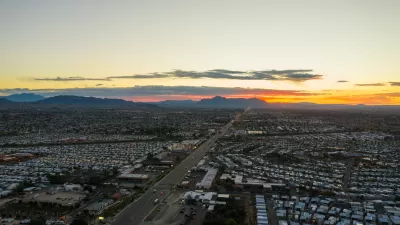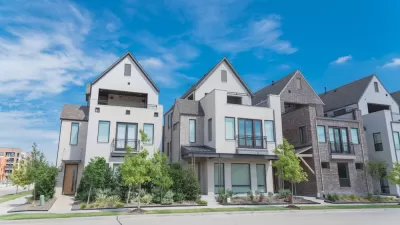Linking zoning reform mandates to CDBG funding is not an effective way to change exclusionary zoning.

Jenny Schuetz considers a strategy to address exclusionary zoning by putting provisions on grants to cities through the Community Development Block Grant (CDBG) program. The award of CDBG grants could require reform of regulations that hinder local development, says Schuetz.
“A statutory formula set by Congress determines the amount of funding for each locality, based on population size, poverty, housing age, and housing conditions. By design, larger and poorer communities receive more funds through the entitlement program,” notes Schuetz. For an exclusionary zoning reform mechanism to work, CDBG funds need to be a primary revenue source for a community receiving the funds directly from the Department of Housing and Urban Development (HUD).
Schuetz takes a closer look at exclusive cities, “defined as those with high rents and little rental or multifamily housing,” in California and New Jersey. Only 17 percent of these California cities receive CDBG funding, and no exclusive cities in New Jersey receive these funds. The California cities could be targets for zoning reform to encourage more affordable housing, says Schuetz:
However, low-income residents who are the intended beneficiaries of CDBG projects have little political influence over zoning decisions in affluent neighborhoods. Moreover, these cities are a small share of CDBG grantees. Undertaking the costly process of revising a federal regulation that affects thousands of communities in order to influence a handful of grantees is like performing brain surgery with a chainsaw.
Schuetz suggests alternative strategies HUD could pursue, including the HUD Secretary talking more directly about the need for zoning reform. “Explain how restrictive zoning harms not just low-income families but regional housing markets. Name and shame worst offenders, or applaud cities that have undertaken zoning reform. Provide direct guidance on what specific zoning practices should be changed.”
She also encourages HUD staff to use the wealth of data and analysis available to the agency and recommends that HUD bring together different stakeholders to come up with politically viable solutions.
FULL STORY: HUD can’t fix exclusionary zoning by withholding CDBG funds

Planetizen Federal Action Tracker
A weekly monitor of how Trump’s orders and actions are impacting planners and planning in America.

Restaurant Patios Were a Pandemic Win — Why Were They so Hard to Keep?
Social distancing requirements and changes in travel patterns prompted cities to pilot new uses for street and sidewalk space. Then it got complicated.

Map: Where Senate Republicans Want to Sell Your Public Lands
For public land advocates, the Senate Republicans’ proposal to sell millions of acres of public land in the West is “the biggest fight of their careers.”

Maui's Vacation Rental Debate Turns Ugly
Verbal attacks, misinformation campaigns and fistfights plague a high-stakes debate to convert thousands of vacation rentals into long-term housing.

San Francisco Suspends Traffic Calming Amidst Record Deaths
Citing “a challenging fiscal landscape,” the city will cease the program on the heels of 42 traffic deaths, including 24 pedestrians.

California Homeless Arrests, Citations Spike After Ruling
An investigation reveals that anti-homeless actions increased up to 500% after Grants Pass v. Johnson — even in cities claiming no policy change.
Urban Design for Planners 1: Software Tools
This six-course series explores essential urban design concepts using open source software and equips planners with the tools they need to participate fully in the urban design process.
Planning for Universal Design
Learn the tools for implementing Universal Design in planning regulations.
Heyer Gruel & Associates PA
JM Goldson LLC
Custer County Colorado
City of Camden Redevelopment Agency
City of Astoria
Transportation Research & Education Center (TREC) at Portland State University
Camden Redevelopment Agency
City of Claremont
Municipality of Princeton (NJ)





























